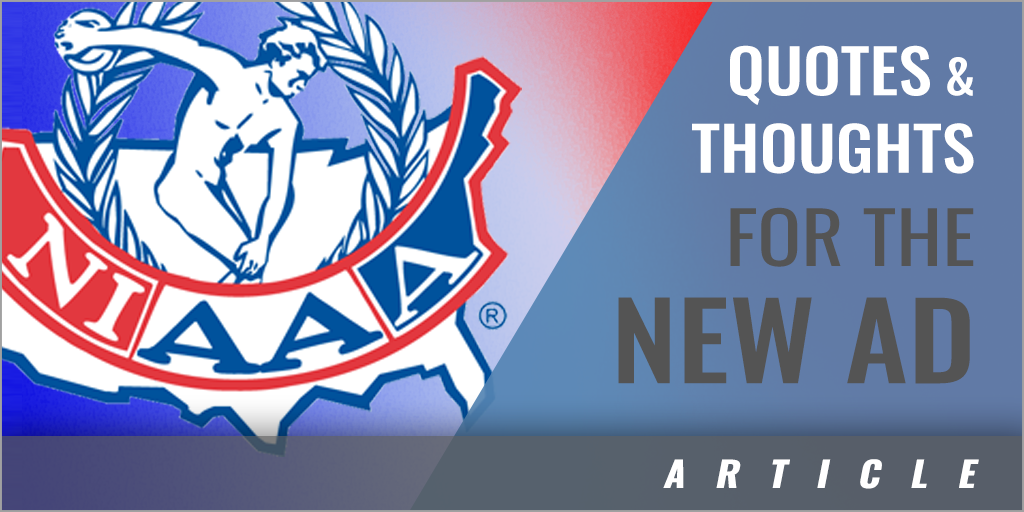|
By: Dr. Mark Rerick, CMAA - University of North Dakota What should I be doing right now? Most athletic directors ask themselves this question multiple times in their first year on the job despite knowing there aren't enough hours in each day to complete their full checklist. Organizing and prioritizing those many tasks can be difficult, and new athletic administrators lack the experience to know which duties can be ignored for a while and which duties need to be completed before becoming real problems. As a result, when new ADs ask for help, they're often asking for advice regarding what to do or how to do it. Ask any veteran athletic director to give advice to new ADs, and they'll rapidly generate a long list of character traits and task-management suggestions. Those new athletic administrator tips and tricks lists will usually include great suggestions about organization, communication, delegation of tasks, stress management, mentorship, preparation, and others. The number of things a director of athletics needs to become good at can quickly be overwhelming, so I think it's also important to share some advice about how to approach every day in the office. I love a good top ten List, but I've always preferred to have a quote that could be hung up as a reminder of how to approach situations throughout the day. Rather than suggesting an "athletic direct like a champion today" sign above the office door, I'm offering these four quotes to new athletic directors as suggestions to apply to tasks and interactions throughout each day. "Borrow from the good; steal from the great." Tracking down an original source for this quote has proven to be impossible, so attempting to decipher a summarized intent and meaning for the many variations of these words is also impossible. For the purposes of our profession, though, I interpret the best usage of this quote in its literal form: borrow suggestions and materials from the good; steal suggestions and materials from the great. During the first year, particularly in a new school or area, athletic directors may not have a large enough network to know whose content and methods are worth using. This is made worse if they take over from a previous administrator who wasn't good at their job. There may not be many effective policies and procedures already in place. If athletic directors find themselves starting from scratch, the thought of creating multiple procedures all at once can be overwhelming, both in time and in effort. In those cases, using methods that have already been established by others can be a good practice for quick implementation. Instead of simply grabbing anyone's information, it's best to try to understand which athletic programs in the area are well run. While new athletic directors may not be getting the best possible policy and procedures, they can find solid, workable methods by borrowing from those good athletic administrators in the area. As new athletic directors learn more about their school, conference, and surrounding athletic programs, they will learn more about which other directors of athletics in the area are the most respected. Once those great athletic administrators are identified, it's time to steal their methods for implementation into the new program. Making changes from one method to another will require athletic directors to admit that the current system isn't the best system for the school. In order to admit changes need to be made, this next quote could be helpful. "…I have humility enough to confess my errors and to retrace my steps." "No one should be ashamed to admit he is wrong, which is but saying, in other words, that he is wiser today than he was yesterday." The full quote from Gandhi is a little bit longer but provides more context to his thoughts. "I claim to be a simple individual liable to err like any other fellow mortal. I own, however, that I have humility enough to confess my errors and to retrace my steps." Gandhi's acceptance of being human alongside understanding the need to admit to mistakes meshes well with Pope's recognition that mistakes lead to knowledge and growth. Athletic directors tend to be the lone administrator in charge of the athletic landscape. As such, there is an unreasonable expectation that the athletic director will know everything, have every answer, and be able to operate without fail all day, every day. Communities place a high level of importance on the competitive success of their sports teams, and the competitive success of individuals has much to do with the perceived worth of student-athletes on the team. Any negative consequence administered to a team or individual will be met with resistance, so athletic directors feel the need to always be correct. Unfortunately, feeling the need to be correct alongside having no one else to assist in decision-making can lead to athletic directors instinctively defending their actions. To not appear weak or indecisive, it may be simpler to continue supporting an initial decision rather than admitting an error, and if an error is never admitted, no growth can take place. New athletic directors need to remember that they are human. Just because an athletic administrator works on an island doesn't mean he or she is always correct, and that's OK. Admitting mistakes not only provides space for new knowledge and continued growth, but it can also help build rapport with external stakeholders. Instead of being an infallible, untouchable persona on a pedestal, leaders can show they are people, too. The key to being able to admit mistakes, however, is not making many of them in the first place. Generally, there are two main reasons why mistakes are made by leaders: a lack of knowledge or a lack of process. A lack of knowledge on any topic or decision can be delayed by one simple response: "I don't have an answer for you right now, but I'm going to find it as soon as possible." Instead of making a best guess at a correct answer, leaders can delay their response by promising to dig deeper into the question. As new athletic directors can gain experience, the instances of completely unknown circumstances will gradually be reduced. Of course, those who have been in the profession for a long time can recount instances that didn't ever seem possible, but eventually, most questions can be answered by using past precedent. A lack of process for decision-making is, by far, the bigger danger for any administrator. Making decisions without any rationale will quickly lose the trust and forgiveness of stakeholders. The reasoning of "because I said so" doesn't work with our own children at home, and it definitely won't work for athletes, coaches, or parents who want to know why something was done the way it was done. As covered in LTC 719, athletic directors need to have an intentional process for decision-making. If a process is followed, and if the appropriate information is gathered, administrators should be able to reasonably explain why a decision is made. That obviously doesn't ensure that everyone will agree with the decision but being able to explain the decision-making process goes a long way towards building bridges between the athletic office and its stakeholders. Related to the process of decision-making and problem-solving as it pertains to conversations with various stakeholders, this next quote is an excellent one to place by the phone. "As long as you have the final say, give up the last word." Early in my athletic director career, I was certain that part of my job was to make sure that everyone not only knew what I knew but also agreed with the direction we were heading. Contentious conversations with parents or coaches often seemed to never end because I would continue to repeat my position while they continued to repeat theirs, and nobody changed their minds. I was convinced that as long as I continued to enforce my position and explain my reasoning, whoever I was talking to would eventually see the light and join me. One incident finally highlighted the power structure inherent in an administrator's role. I had met with a student who was starting a suspension for a rule violation. The student wanted a meeting with me to question the philosophy behind the rule. The student, his parents, and I were all in agreement that the rule had been violated, but the family wanted to know more about the "why" for the rule. The family initially indicated that my meeting just with the student would suffice, so I called him into my office. This is an overly simplified summary of our discussion: Me: *explains the why for the rule* When speaking to the student, we both understood that the student's opinion about the philosophy behind the rule wasn't going to change anything. Whether we spoke for a couple of minutes or for a couple of hours, the student was still going to be suspended for violating the rule. Beyond that, this particular rule had been discussed and debated multiple times by a group of administrators, and we were solid in continuing to do what we were doing. The student's viewpoint wasn't going to change that. After the student contacted his parents, I received a follow-up call from them. The reality of the situation is that his parents' opinion wasn't going to change our rule any more than his opinion did, but I still allowed the conversation to look more like this: Me: *explains the why for the rule* On and on we went. By the end of the conversation, I hadn't changed my mind; they hadn't changed their minds; the student was still suspended for the rule violation; the parents were still mad at me; and I had lost close to an hour of my day. Most likely because I was speaking with adults, I tried to keep the conversation going until the parents agreed with me even though I had recognized early in the conversation that it wasn't going to happen. The end result was the same, but I had wasted an hour of our day trying to prove how smart I am. The quote from Marc Davis is great advice in these situations. The parents wanted to vent their frustration and disagreement, so the best thing I could have done was to allow them to vent, confirm that we weren't going to agree on this topic, then end the conversation to move on with the day. Athletic directors have the final say in most conversations throughout the day. As long as we're solid with our own reasoning, we don't have to get in the last word. Having solid reasoning for problem solving leads me to my last quote for new athletic directors. "Do the best you can until you know better. Then when you know better, do better." The worst reason for doing something is because you've always done it that way. When I've moved from one school to another in the past, few things frustrated me more than when nobody in the organization could explain why a certain policy or procedure was done the way it was. I would use these instances as opportunities to explore our current methods and compare them to alternate methods to see what might fit our school best. Sometimes, we'd land back on our current policy, but now everyone knew why we were doing what we were doing. It's important that we don't fall into the trap of thinking that our way is the best solely because it's our way. New athletic directors will inherit their policies and procedures, but they aren't infinitely stuck with them. As knowledge and experience is gained, new ADs should spark conversations towards improving the department. You don't know what you don't know, but once you know it, you'd better use it appropriately. Leadership positions can be isolated at times, but that isolation doesn't have to affect a leader's humanity. Those four quotes can provide excellent philosophical guidelines for new athletic directors as they learn more about their schools and positions. |







